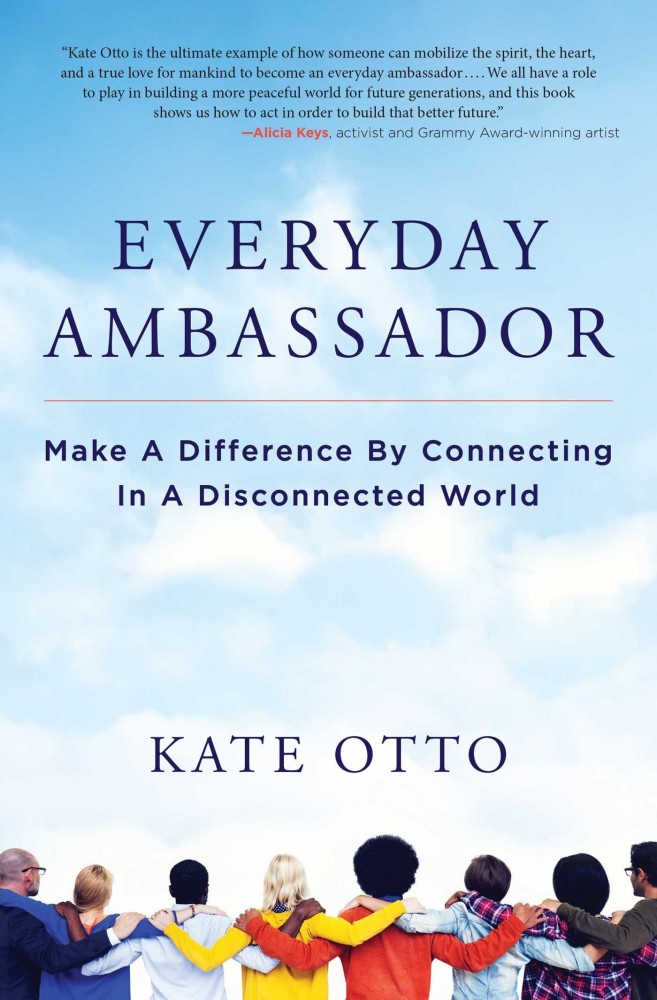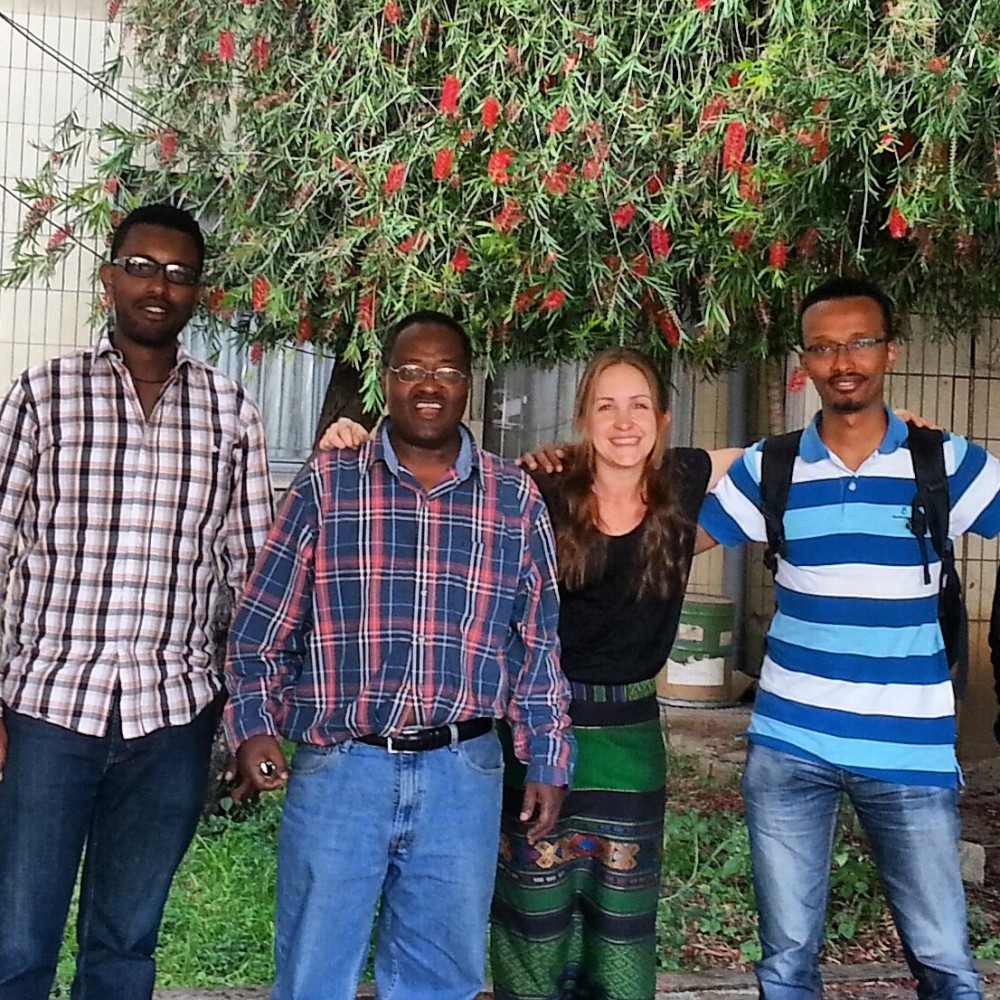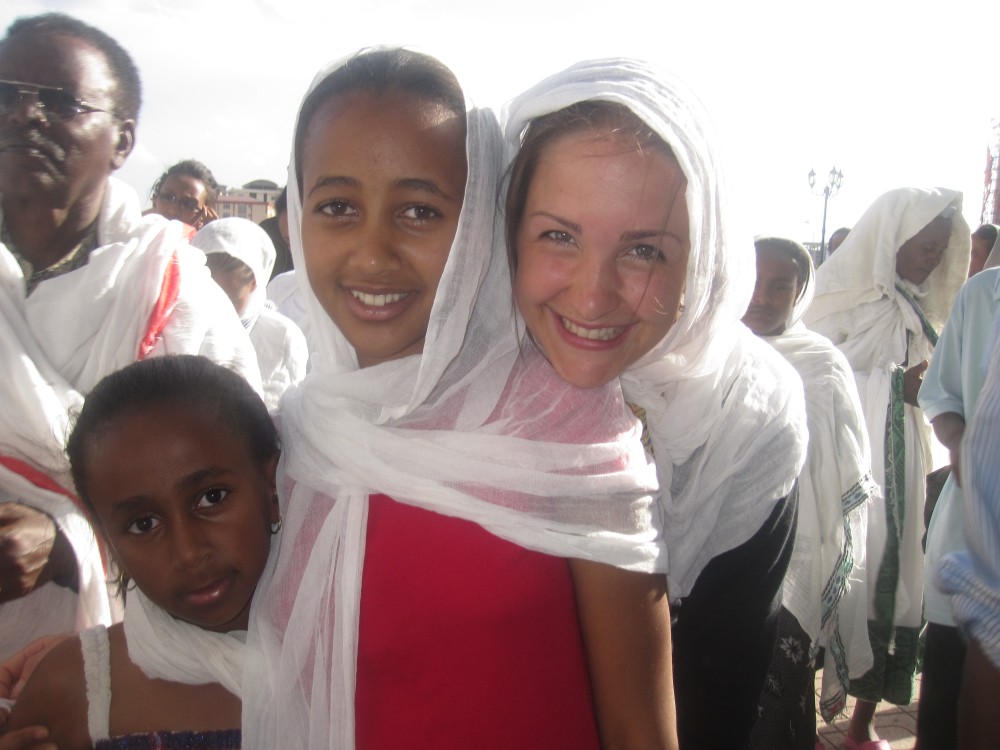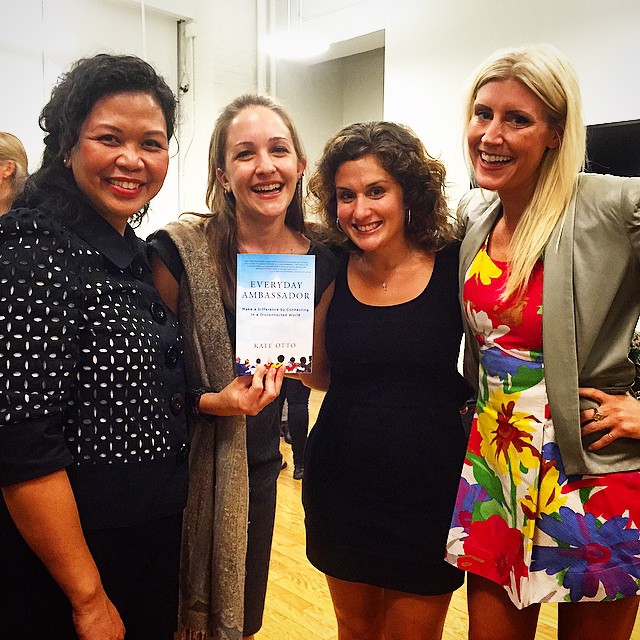Exclusive Excerpt: Everyday Ambassador by Kate Otto
 The following is an exclusive excerpt from Kate Otto’s newly released book, Everyday Ambassador: Make a Difference by Connecting in a Disconnected World. This excerpt has been modified by the author as an exclusive feature for OhThePeopleYouMeet.
The following is an exclusive excerpt from Kate Otto’s newly released book, Everyday Ambassador: Make a Difference by Connecting in a Disconnected World. This excerpt has been modified by the author as an exclusive feature for OhThePeopleYouMeet.
“Bechawenyebela, bechawenyemotal. He who eats alone, dies alone.”
This simple yet thought-provoking proverb came as a gentle suggestion from my Ethiopian colleague Asfaw, as we strode the cracked sidewalks of Addis Ababa, Ethiopia, one April afternoon.
His scratchy, soft voice announced this ancient Amharic proverb as we walked toward a hidden canteen in the shadow of our enormous office complex, hurrying our pace as gray clouds began to open up above. His adage was a warning as subtle as the sky’s.
He who eats alone, dies alone.
Asfaw and I were conducting public-health research together for an international development organization—one of many institutions that design and fund multimillion-dollar programs in health, education, agriculture, and other public services to improve the social and economic well-being of marginalized people. On that particular afternoon, we still had a budget to construct, data collectors to coordinate, and Ministry of Health meetings to plan. His proverb was a polite, indirect criticism of a suggestion I’d made just minutes earlier to eat lunch at our desks. From my perspective, our overdue deliverables and long to-do lists necessitated mealtime multitasking. I was impatient, eager to finish our work, and as someone in the early stages of my career, I wanted to be perceived as efficient, hard- working, and ambitious.
But Asfaw, with the authority and wisdom that came from being twenty years my senior and from a more communal culture than I, refused to take part in my game. He denied me with a polite chuckle and led the way out of our office toward the nearest restaurant.
We settled onto foldout chairs around a small table. He returned to his Amharic wisdom as we peeled off pieces of njera, a sour, spongy flatbread, from the platter’s edges and used them to grab up the savory beef chunks and sauces spread across the center.
“Do you understand what I mean by that proverb?” he asked me outright, his trilled r’s rolling off his tongue as he gestured to the food with one hand and reached for a chunk of doro wot with his other. I raised an eyebrow to signal that I had no idea and wanted to hear more; he caught my cue and carried on, snatching another bite. “It’s from a story about a man who visits hell.”
I leaned on my elbows, inching toward Asfaw to signal my full, unmultitasked attention.
“There in hell, this man finds a table full of starving, suffering souls, even though they sit around a table full of food. They are starving because the only spoons on the table are so, so long.” Asfaw exaggerated his words playfully, looking off as if this depressing scene were playing out on the canteen’s doorstep. “These spoons are so long they cannot feed themselves! These people are really suffer- ing.” He glanced at me again, and I nodded for him to carry on.
“Now. This same man goes on to visit heaven, and he sees almost the same thing: all the people, all the food, all the very, very long spoons. But this crowd is joyful! No one is hungry, and everyone is rejoicing.”
I squished up another lump of njera but paused before bringing it to my mouth, picturing this juxtaposition of starving demons and full-bellied angels both with torturously long utensils. Asfaw’s point became clear to me as he delivered his final words.
“The people in heaven, they used the spoons to feed each other.”
***
Asfaw, Kate, and fellow project teammates in Ethiopia
Life in the twenty-first century is not so unlike the scene behind Asfaw’s ancient proverb. While sharing a meal is a universal manifestation of the joy of interpersonal connection, socialization is a joy now commonly facilitated via digital devices—laptops, smartphones, and phablets—and social networking applications like Facebook, Twitter, Instagram, YouTube, and any method of instant messaging. We humans are becoming limitless in our capacity to connect, and digital communion is becoming as commonplace as daily bread.
But all too often, our tech tools become long-handled spoons, and with no one to help us, we’re rendered hell-tethered demons.
Rather than technology manifesting social connectedness, it is common that technology ends up shaping our behaviors and habits toward greater isolation. Allowing digital life to interrupt human interaction is now a commonly noted vice: friends seated around a dinner table, each fully engaged in whatever’s happening on the glowing screen of his or her smartphone instead of the present, human company; your colleague only partially listening to your conversation because she’s sending a text at the same time; nearly colliding with another pedestrian on the street because you’re too engrossed in reading an email in the palm of your hand to concentrate on walking courteously.
My life, and perhaps yours too, has become more digitally involved with every month and year that passes. In the same spirit as the mission of “Oh the People You Meet,” Everyday Ambassador has issued a call to action that we think will help prevent disconnectivity, and promote long-lasting relationships with our global neighbors.
Everyday Ambassadorship is a lifestyle of service and citizenship, focused on practicing the four key values of Focus, Empathy, Humility, and Patience, and putting human connection at the center of every adventure we embark on—whether it’s a complex work trip or a relaxing tourism vacation.
***
Kate and family friends in Addis at church.
It has now been over three years since that overcast afternoon in Addis Ababa, when Asfaw and I dined on njera and doro wot, deeply engaged in feeding each other through conversation and dialogue rather than sitting isolated behind our computers. Although our project resulted in a notable outcome—creating a mobile phone–based patient management system, allowing rural Ethiopian health workers to minimize maternal and child deaths—I feel equally as proud of the deep friendship we forged.
Over the past several years, Asfaw and I persevered throughout a long and at times challenging path toward success, despite frustrating setbacks and obstacles that would have never been overcome without obligation and commitment to each other and our work. We developed a fluent pattern of efficient workflows that included— not overlooked—family updates and personal news. “How is your son doing at medical school?” I asked, aware of how thrilled he was to have Nathaniel follow in his professional footsteps. “How is your grandfather’s health?” he inquired, remembering Papou’s recent stroke.
Practicing this deeper connection illuminates for me the pieces of our cultures, perspectives, and lives that we share with one another, which in turn enriches us professionally and nourishes us personally.
I learned soon after my first lunch meeting with Asfaw about the particular Ethiopian mealtime custom called gursha—the practice of literally feeding one another. Gursha involves tearing off a soft slab of njera, grabbing a portion of wot, the size of which is said to be proportional to the amount of affection you hold for someone, and moving that handful of food directly into the beloved person’s mouth. This is done before anyone else touches the food on the table, most often by the host to a guest, and constitutes a sign of respect and appreciation. It is a custom I have felt humbled to experience and a norm I like to reciprocate, to signal back my gratitude.
Everyday ambassadorship is, at its core, an exercise in feeding one another, in revolutionizing the idea of service as a two-way street. In our world today, the question is no longer “Can we get along?” with people so different from us. Rather, it’s “How will we get along?” with our diverse global neighbors.
This is a choice you make, every day. What will it be today?
This is, after all, how the world changes: through small, positive exchanges that correct misperceptions and promote peaceful behavior. One-on-one interactions may seem to make a minimal difference, but an impression left on one person or community sends out ripples that influence entire social norms and, eventually, create a new standard of international relations: the grassroots diplomacy that leads to lives being changed for the better.
L to R: Maryann Fernandez, Philanthropy Indaba Founder and OTPYM contributor; Author Kate Otto; Nikki Pepper, OTPYM Deputy Editor; Michaela Guzy, OTPYM Founder.




